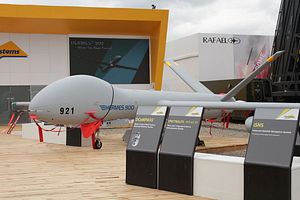Israel has once again enjoyed a very significant presence during the recently concluded Defexpo, held in New Delhi, and Singapore Airshow. Not only did it show off its state-of-the-art weapons systems; the diminutive state was able to clinch a few important deals with countries in the region. The participation of a considerable number of defense firms, both state-owned and private, itself is an indication of Israel’s desire to forge closer military-security cooperation with countries such as India, Singapore and Vietnam.
The Asia-Pacific is looking an increasingly attractive market for Israeli arms manufacturer, especially as other major countries cut defense spending. For instance, major players such as Israel Military Industries reportedly secured contracts with several Asian countries worth $500 million during 2013, mostly for upgrades of military platforms, sales of heavy munitions, and a variety of military systems. Several important joint-ventures are also underway.
Despite India’s announcement that it would focus Defexpo 2014 on home-grown products, the Israeli pavilion attracted a sizeable audience, including defense planners. During the show, Israel Aerospace Industries (IAI) showcased new products, such as the Katana unmanned ship, advanced radar systems, air defense systems and command-and-control gear for various theaters, including cyber. IAI subsidiary Elta Systems also unveiled its unique and advanced Combat Team Battle Management System (CT-BMS), which that could be useful in addressing the challenges of tactical command, control, collaboration and real-time situational awareness. Similarly, Elbit Systems, for the first time, introduced TREASURES, a UGS system for continuous force or border protection. This system was officially launched during Singapore Airshow 2014.
Israel’s Rafael also exhibited products, such as its Iron Dome missile defense system and Spike anti-tank guided missiles. During mid 2013, New Delhi again considered procuring the anti-missile system. While at first Indian officials were hesitant to commit to Iron Dome, on the grounds that it would be ineffective for India’s long borders and congested air space, Israel’s willingness to share the sophisticated technology behind the system is altering India’s thinking. So although no major arms deals were announced during the Defexpo, this plan to jointly build an integrated anti-missile system was certainly one highlight. The contract, which is likely to be signed within the next six moths, would see collaboration among India’s DRDO, state-owned Bharat Dynamics Limited (BDL) and Bharat Electronics Limited with IAI and Rafael. With IAI and Rafael cleared of bribery suspicions, military cooperation between India and Israel is set to rise.
Israel also made a strong presence at the Singapore Airshow this year, which was attended by Israeli Defense Minister Moshe Yalon, several other military officials and dignitaries from various defense industries. At the show, Elbit exhibited its Hermes 900 Unmanned Aircraft Systems and ANVIS/HUD 24 featuring line-of-sight, in addition to TREASURES. Alongside these systems, IAI’s revamped Super Heron Heavy Fuel drone, which can stay airborne for about 45 hours, attracted considerable attention.
Meanwhile, amid growing concerns over cyber security, IAI’s Elta has decided to launch a new research and development center in Singapore, the first of its kind in the region. Singaporeans will comprise about 80-90 percent of the workforce, benefiting local scientists, engineers and professional computer analysts. This joint project with Singapore’s Economic Development Board signals a transformation of relations from seller-buyer to collaborators. Countries like South Korea and India are also likely to benefit from this R&D program.
Rafael Advanced Defense Systems again impressed by unveiling its Iron Beam high-energy laser system, which is designed to defeat rockets, mortars, and UAVs at short ranges. Israel has started with this program—still in the developmental stage—to combat missile threats from its neighbors.
Vietnam is another potential market for Israeli arms. For instance, Israel Weapon Industries has established a production facility in Vietnam to help supply Galil ACE 31, 32 assault rifles to the Vietnam People’s Army. Given Vietnam’s large army and obsolete weapons systems, Israel could one day be involved in upgrading the Asian country’s defense systems and its technologies.
These developments suggest robust military-security cooperation between Israel and Asia, a marriage of Israel’s willingness to transfer military technologies and the military modernization and upgrade programs of South and Southeast Asian countries. Alongside economic incentives, bilateral relations between these countries will continue to be driven by close defense ties and shared national security challenges. Israel’s interest in these potential defense markets is clear from its willingness to unveil its latest technologies. Although competition is likely to emerge, particularly in the field of drones, for some time to come, Israel will remain an important supplier.
Alvite Singh Ningthoujam is a PhD researcher at the School of International Studies, Jawaharlal Nehru University, New Delhi, India.

































